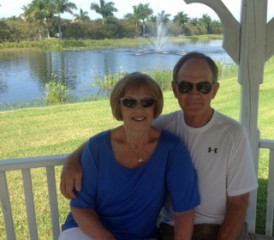Written by Tim Povtak | Edited By Walter Pacheco | Last Update: October 24, 2024
U.S. Navy veteran Ken S. made his living for decades as a poker player, learning to survive, and often thrive, at the table with the hand he was dealt.
He knew this was no time to fold. Instead, it was time to raise the stakes and up the ante.
Ken, 68, whose last name is being withheld over privacy concerns, was diagnosed in July with malignant pleural mesothelioma, a rare but aggressive cancer with no cure and few reliable treatment options. Instead of accepting his fate, he rejected the get-your-affairs-in-order, little-hope advice of his hometown oncologist, and embarked on an aggressive search for the best odds he could find.
It led him from his home town of Billings, Mont. to the University of Chicago Medical Center about 1,200 miles away.
In August, he underwent a major, six-hour surgery that removed the linings around his heart and lungs, a major part of his diaphragm, and a good portion of his right lung.
He likes his chances better now.
“Mesothelioma was a bummer of a hand to be dealt, but you live with it. Then it became how to get the best possible results from what you are dealt,” he told Asbestos.com from his Billings home. “Poker takes a lot of study, research and effort to develop the skill level to make it profitable. That was my theory with mesothelioma.”
Ken became his own advocate last summer, spending hour after hour researching the disease, the doctors who treat it most effectively, and the cancer centers that handle it best. He looked in Boston, Minneapolis and New York. He settled on Chicago and renowned oncologist Hedy Kindler, M.D., head of the Mesothelioma Program at the University of Chicago.
Getting His Best Possible Odds
“I guess in my case of mesothelioma, the jury is still out. If I’m sitting here five years from now – that’s my over-and-under bet – with a decent quality of life, the gamble I took with going to Chicago for major surgery was well worth it. I’ll be content with that decision,” he said. “If I had folded, which is what my oncologist essentially suggested, that would have meant getting the will together and making funeral arrangements.”
Ken is in the midst of a post-surgery, four-cycle chemotherapy regimen that will finish around the holiday season. He has been walking two miles daily, sleeping a little more than usual, but ahead of his rehabilitation schedule. Much of his normal routine has returned. He feels good, considering where he had been the past few months.
He celebrated Veterans Day at home earlier this month like he usually does, hoisting the American flag, and reminiscing with his wife and friends about his days in the Navy. He served in the mid-1960s aboard a destroyer stationed off the coast of North Vietnam, launching missiles at the shore. He often worked in the engine room as a mechanic, handling all the valves, gaskets and pipes covered in asbestos, a known cause of mesothelioma cancer.
“I have no anger, no bad feelings toward the Navy. There is no remorse there. I’m a Navy veteran, and I’m proud of that,” he said. “The only thing I’ll pass on is that ‘the price of freedom is never cheap.’ I’m proud of my service to my country.”
Navy Enlistment Came Suddenly
While he is serious about helping others with a gloom-and-doom disease like mesothelioma, he jokes about his original Navy enlistment.
In 1964, Ken was a not-so-serious 19-year-old freshman at Eastern Montana College, now called Montana State. He was approaching mid-term exams, but hardly attended a single class.
After a long night of partying, the sun rose, and he found himself on the curb outside the local post office where the different branches of service kept recruitment offices. The Navy officer arrived before his peers from the Army or Marines, which settled the debate. He signed up that morning with the Navy, and never returned to his mid-term exams.
“I took partying very seriously then,” he said. “I was going to flunk out of college anyway, and I’d been raised in a very conservative family where you had two major obligations: Get an education and serve your country. I just switched the order and went into the Navy first.”
Ken later used the GI Bill to eventually get his college business degree, which led to decades of making a living playing poker. Although he always made his home in Billings, he spent two weeks each month in Las Vegas at the poker tables.
“It was a hard way to make an easy buck,” he said. “I did other things, too, sold some real estate, built backyard storage sheds, but mostly it was in the gaming industry as a poker player. People thought it was a fun lifestyle: Traveling around the country, sleeping in fancy hotel rooms, and throwing out $100 bills like they were water. It worked for me.”
Helping Others Is His Goal
Since returning home from surgery, he befriended another man with the same rare cancer. They call themselves “The Two Montana Meso Men.” He also has spoken with the mother of a much younger mesothelioma victim nearby, offering guidance and support to both.
His focus now is on helping others, spreading the word that giving up and giving in to the disease is not necessary – and usually not the best option. He wants to set an example with his success.
“This is a fatal disease, a fatal cancer, but the prognosis doesn’t have to be so grim. The most important advice I could give is to get a second and third opinion, making sure you explore all options. Take an active role in your health care. Find a specialist who is an expert in this disease,” he said. “So many physicians don’t know enough about this disease to treat it. You almost have to coach them.”
Ken understands his odds remain long. Even with surgery like his, the majority of mesothelioma patients have a life expectancy of no more than two years. His original oncologist gave him 12 months. Ken prefers to think about the few who beat the odds and lived longer.
“I’m prepared for the worst, but hoping for the best. I’ve always considered myself a strong Catholic Christian, and whatever happens, I’ll accept as God’s will,” he said. “But that doesn’t mean giving up. Not at all. I’ve done a lot to live as long as I can. I could have accepted my original prognosis, but I decided to play my hand a little differently.”







